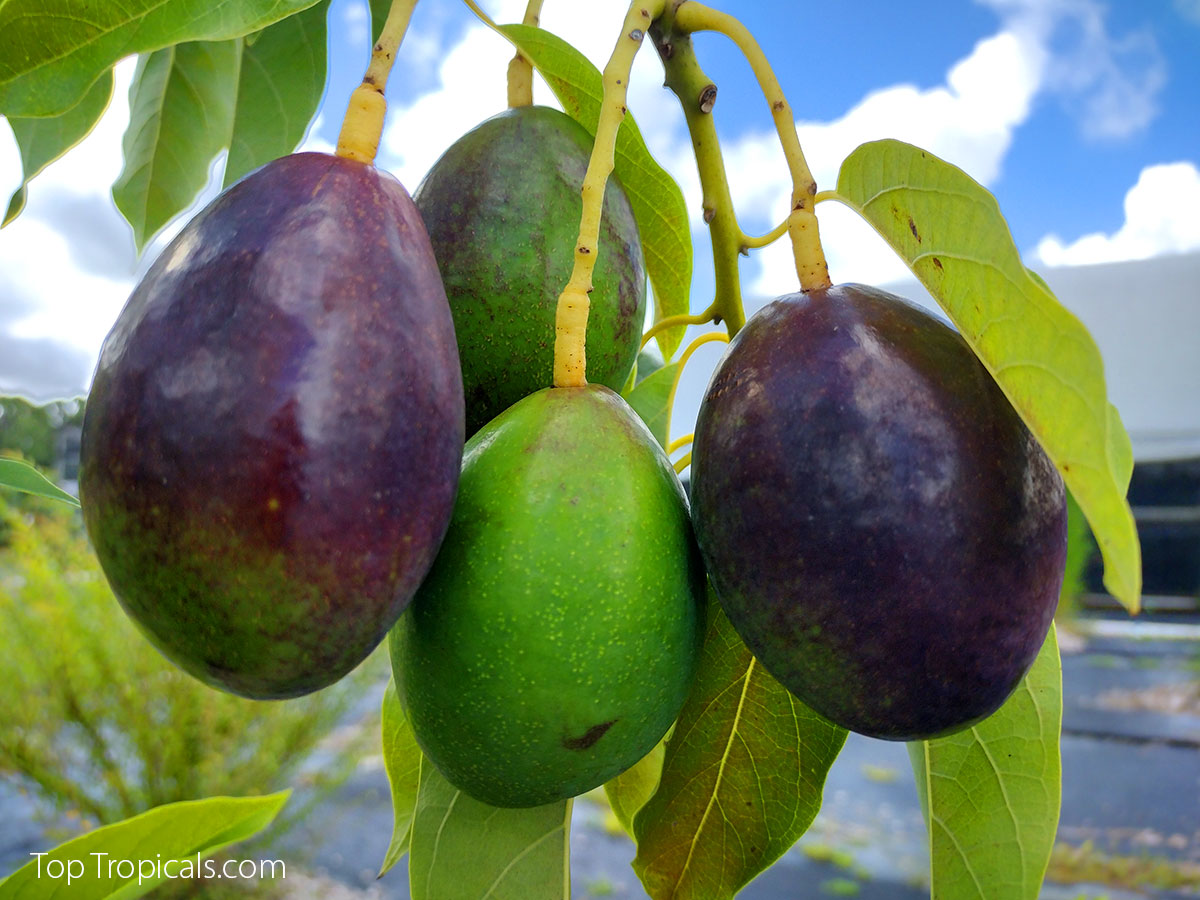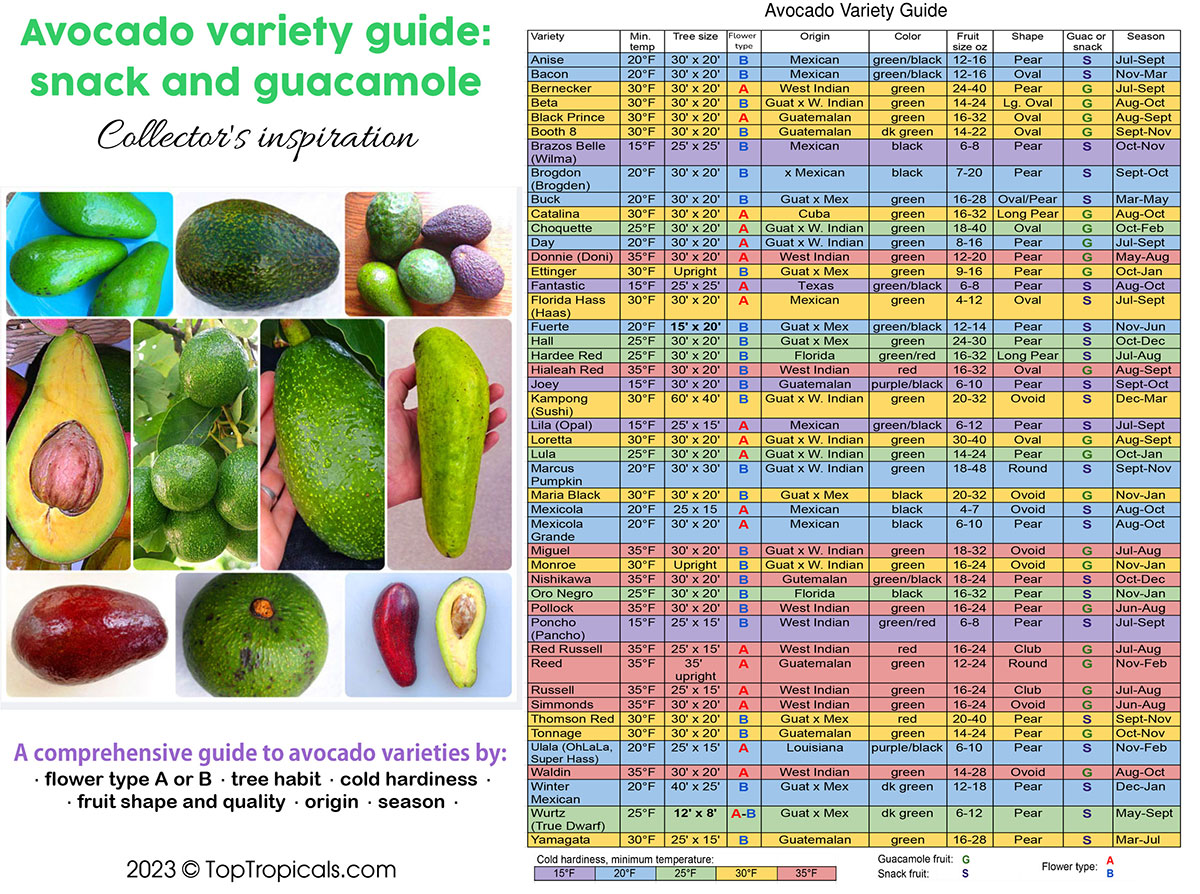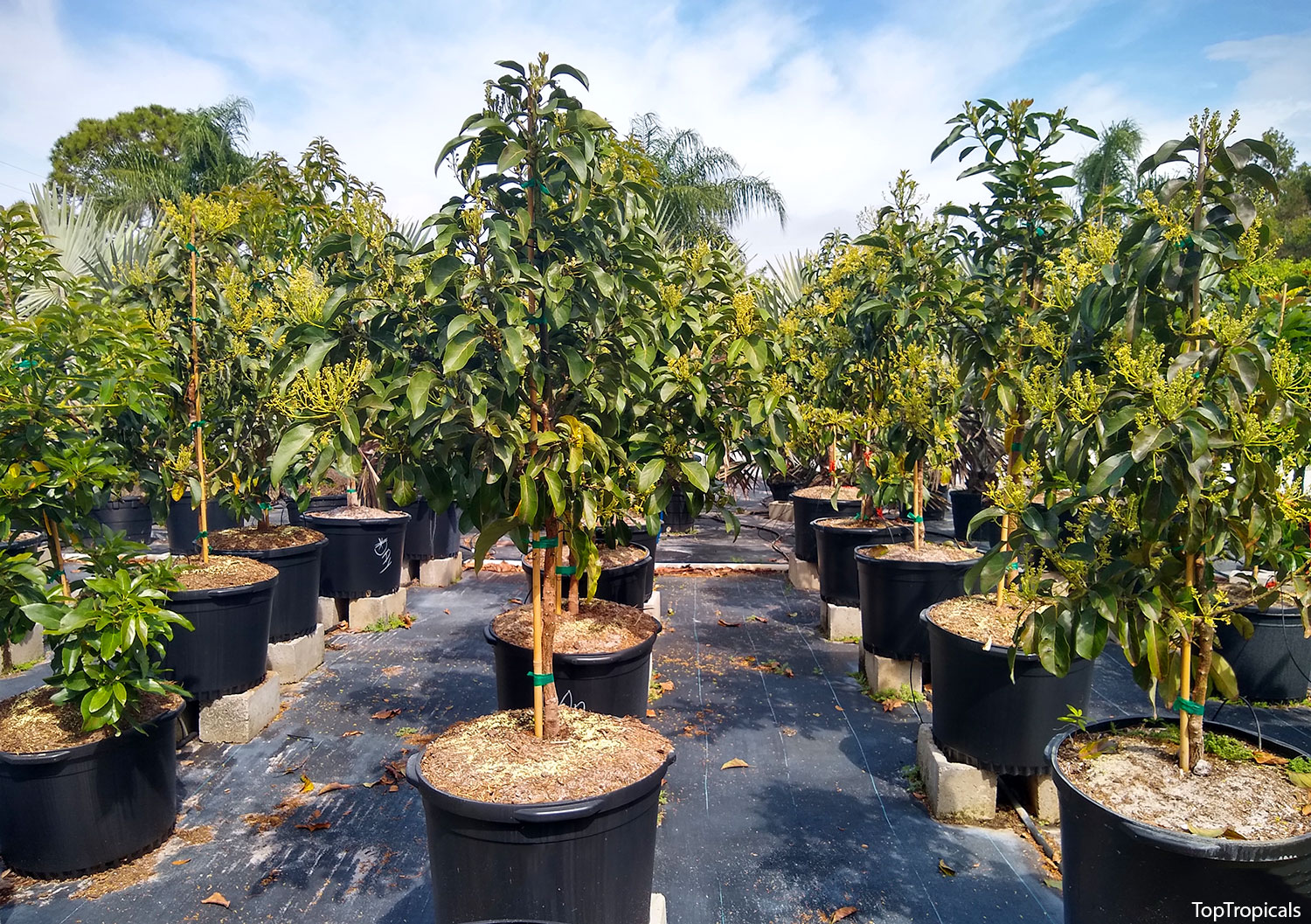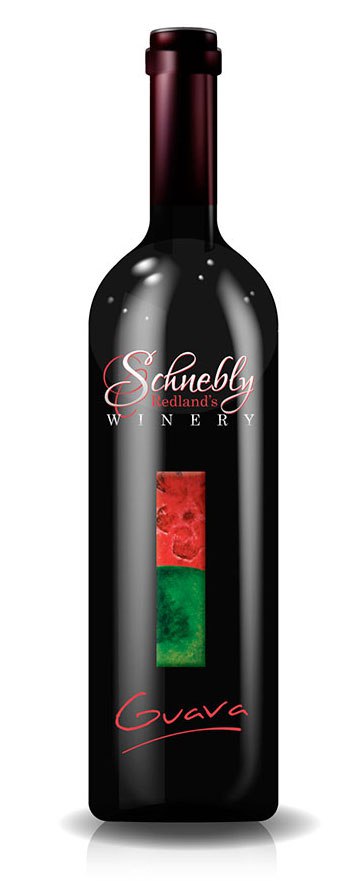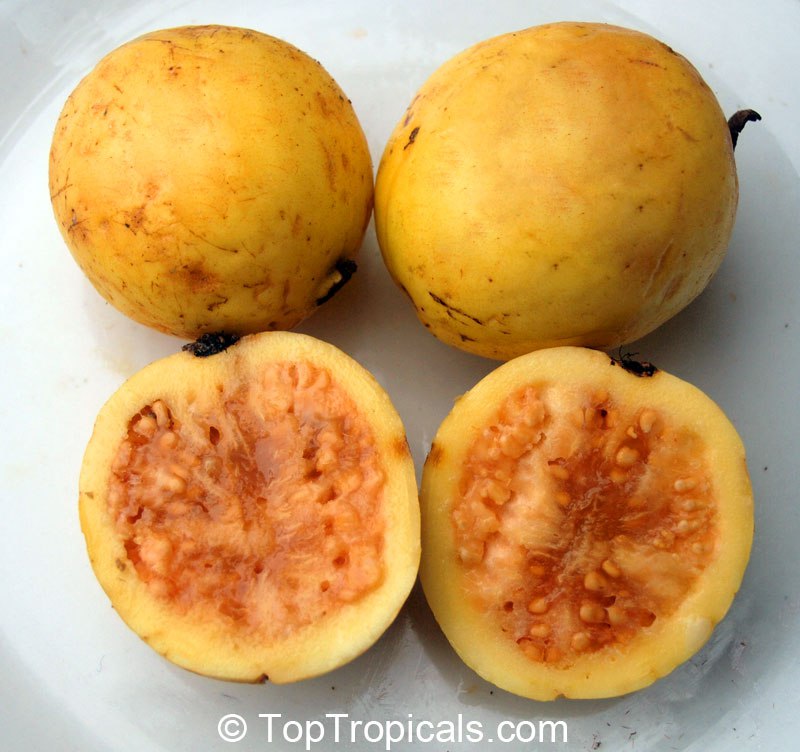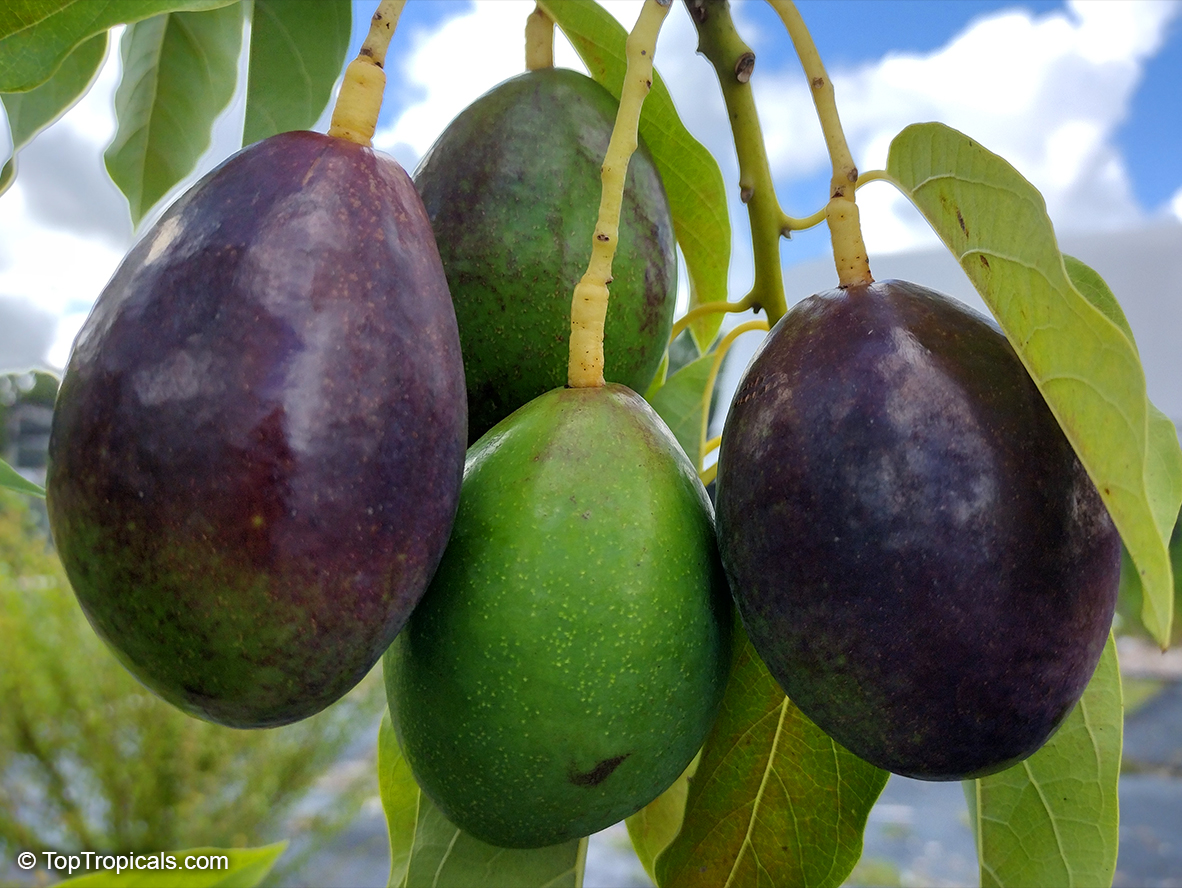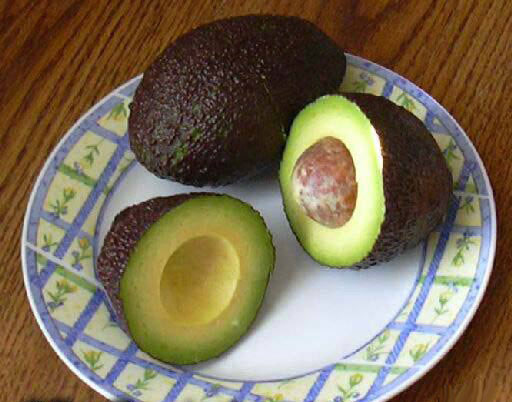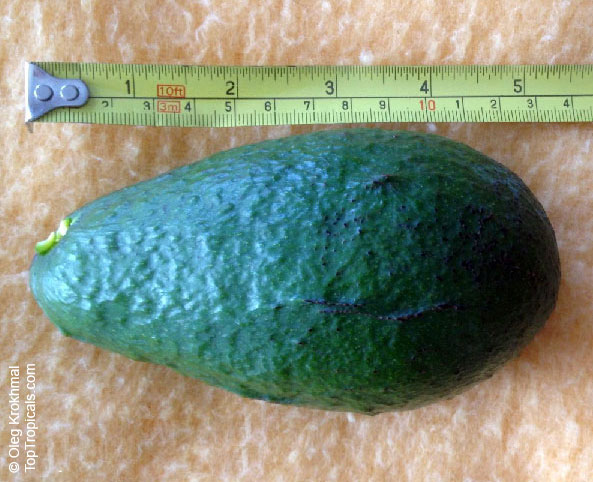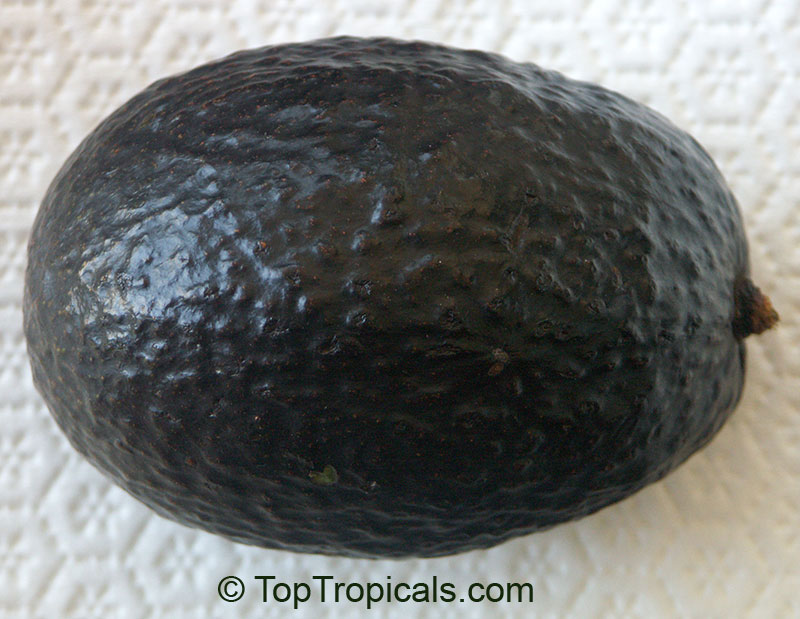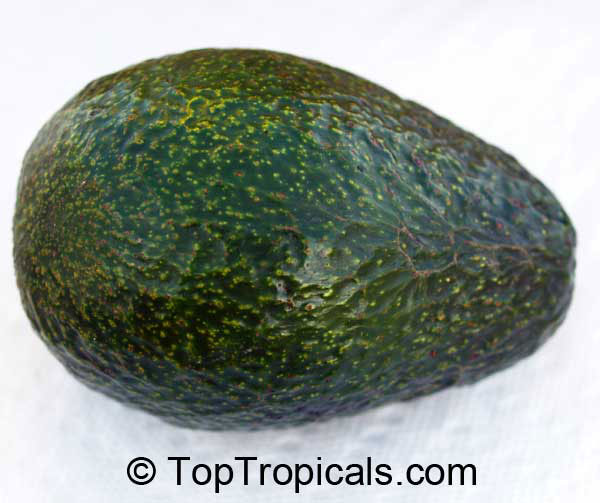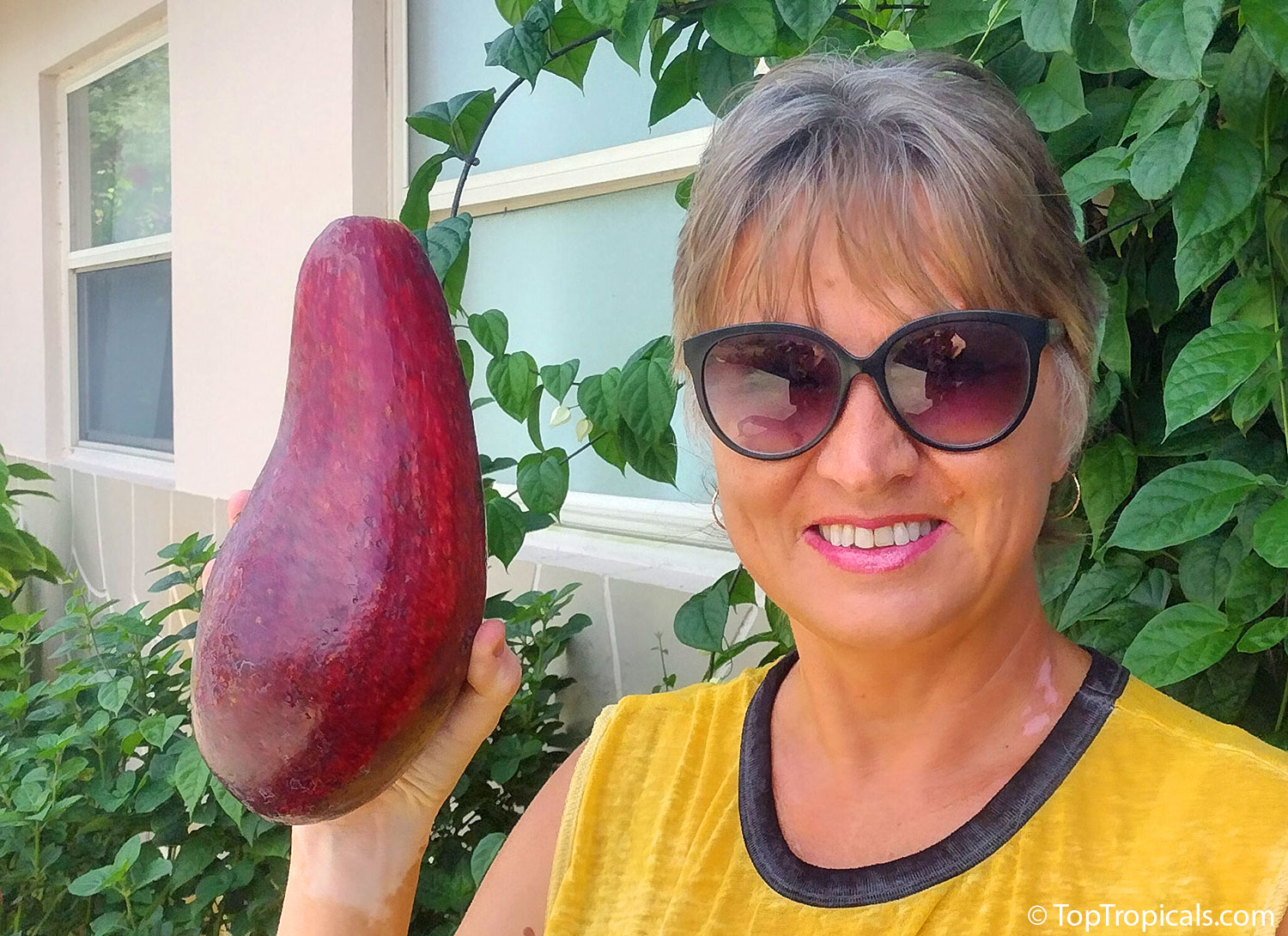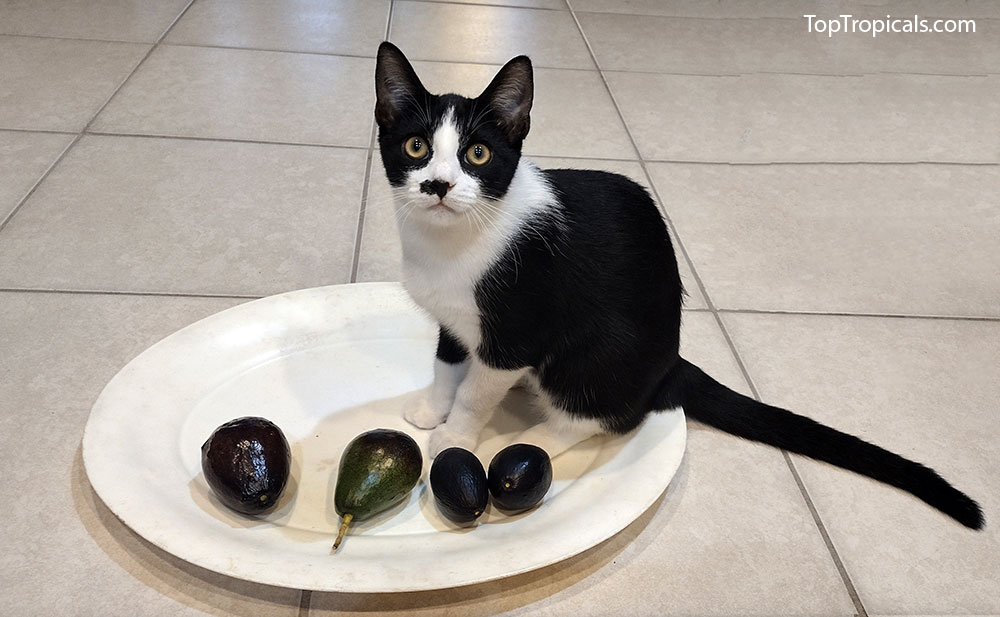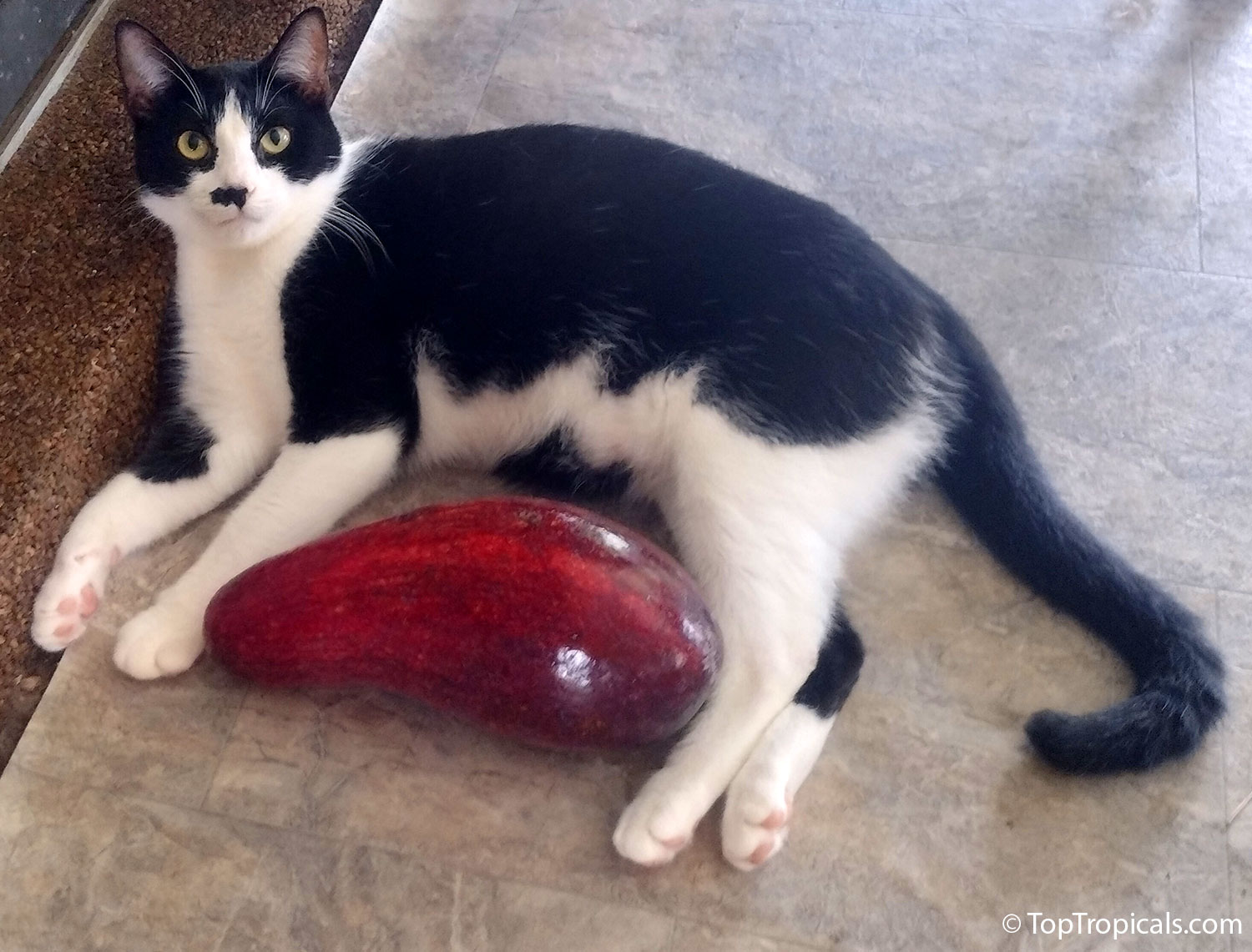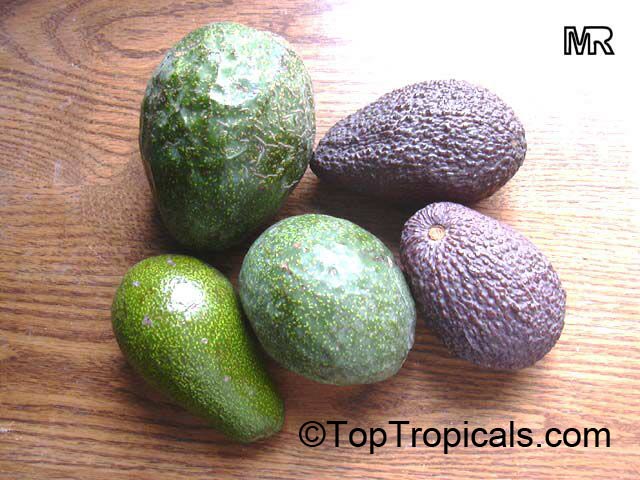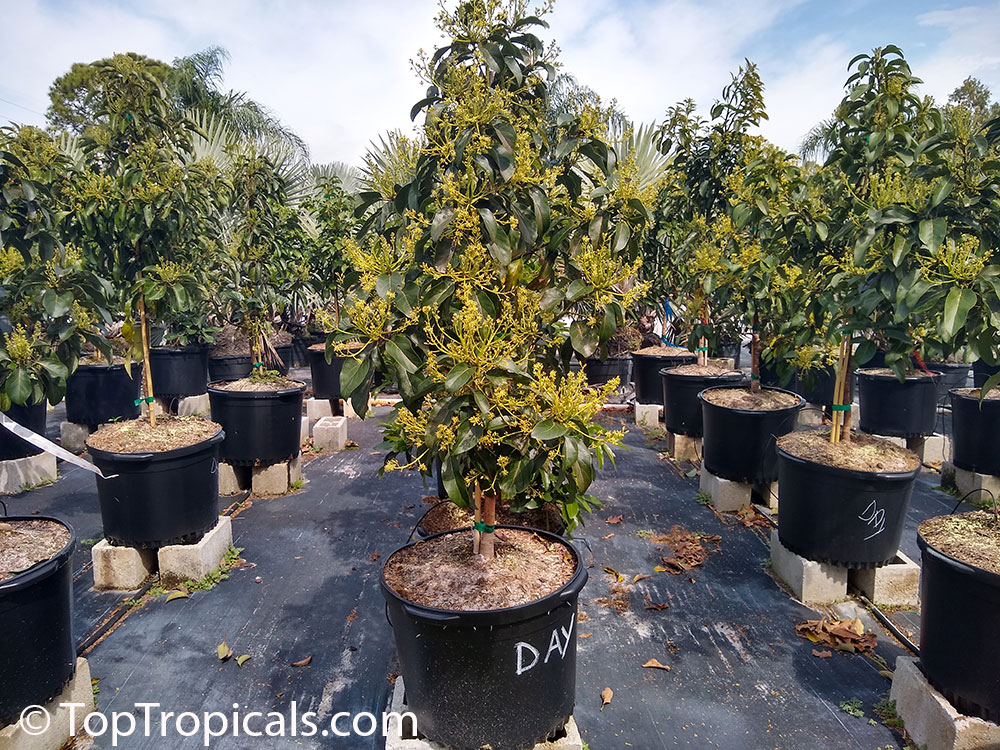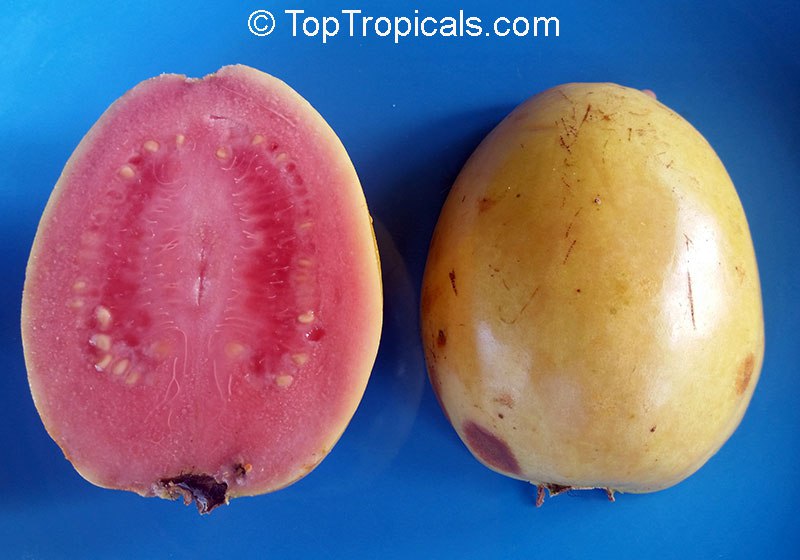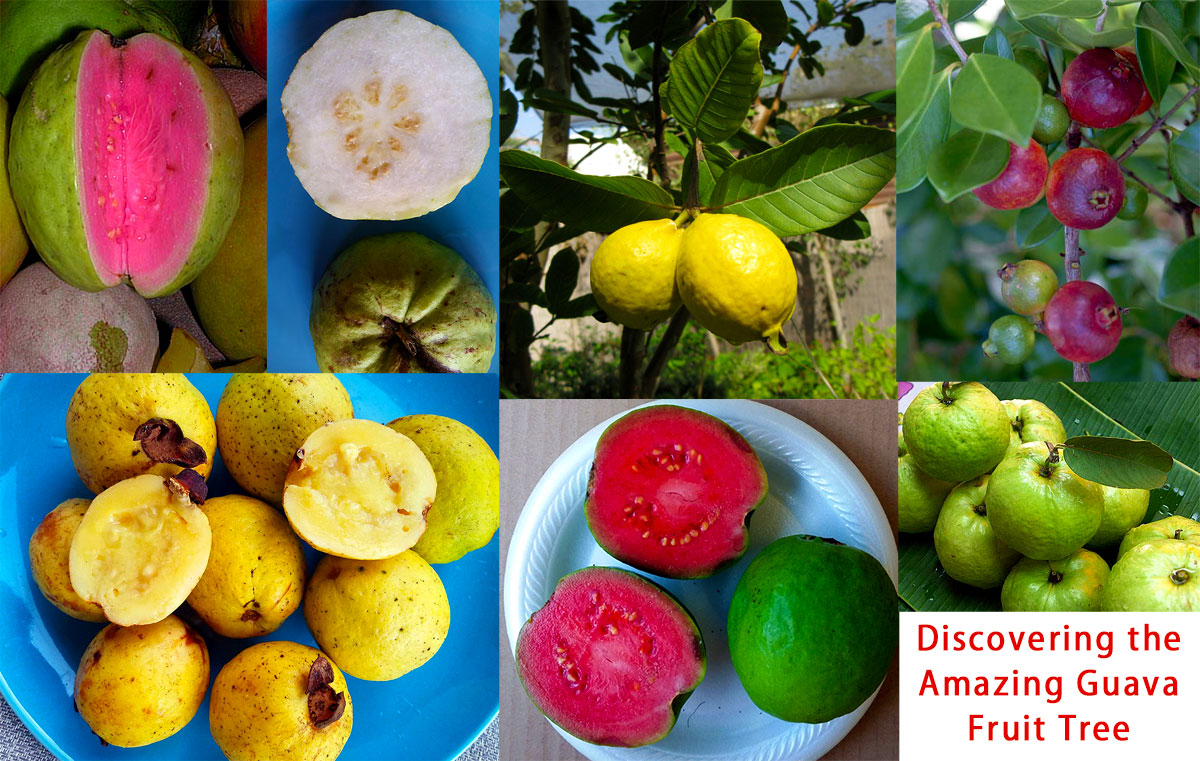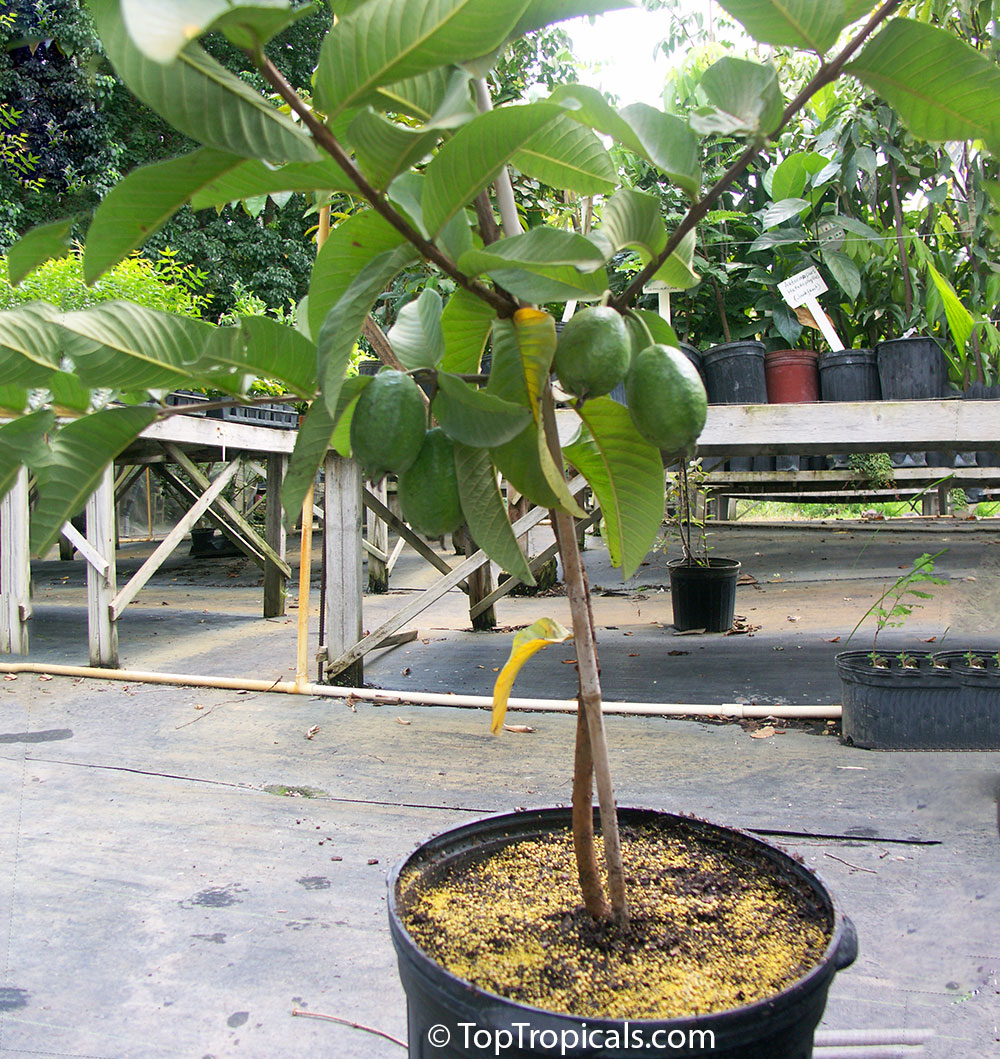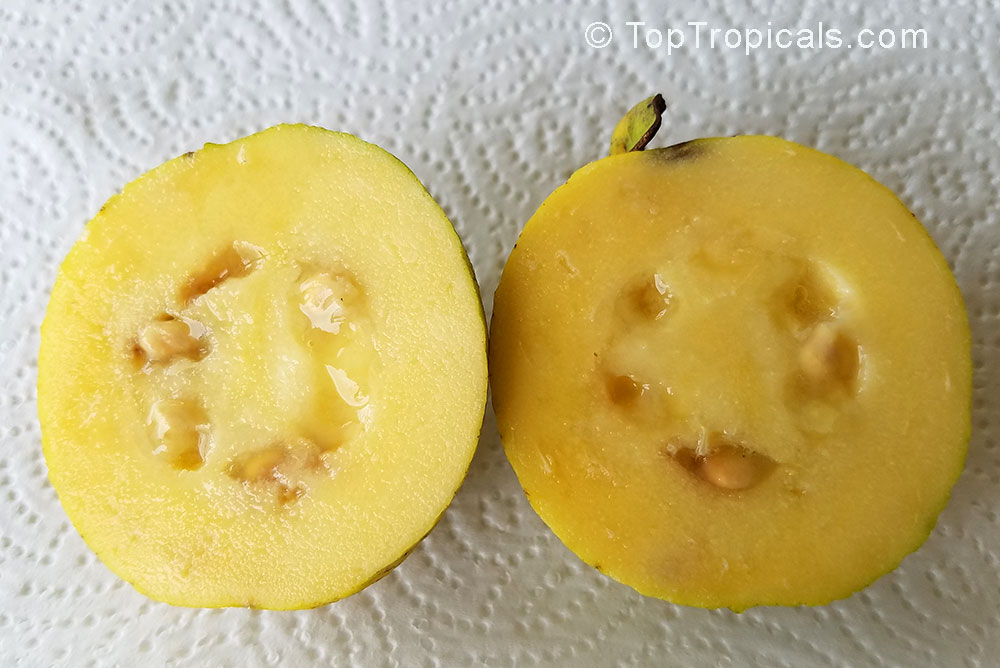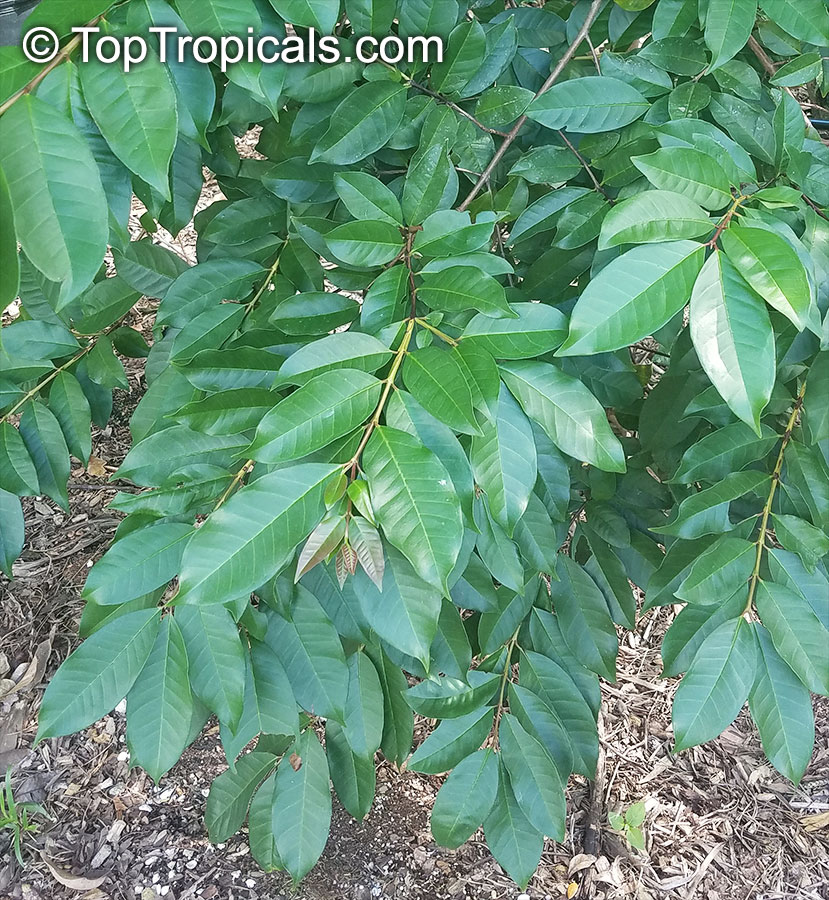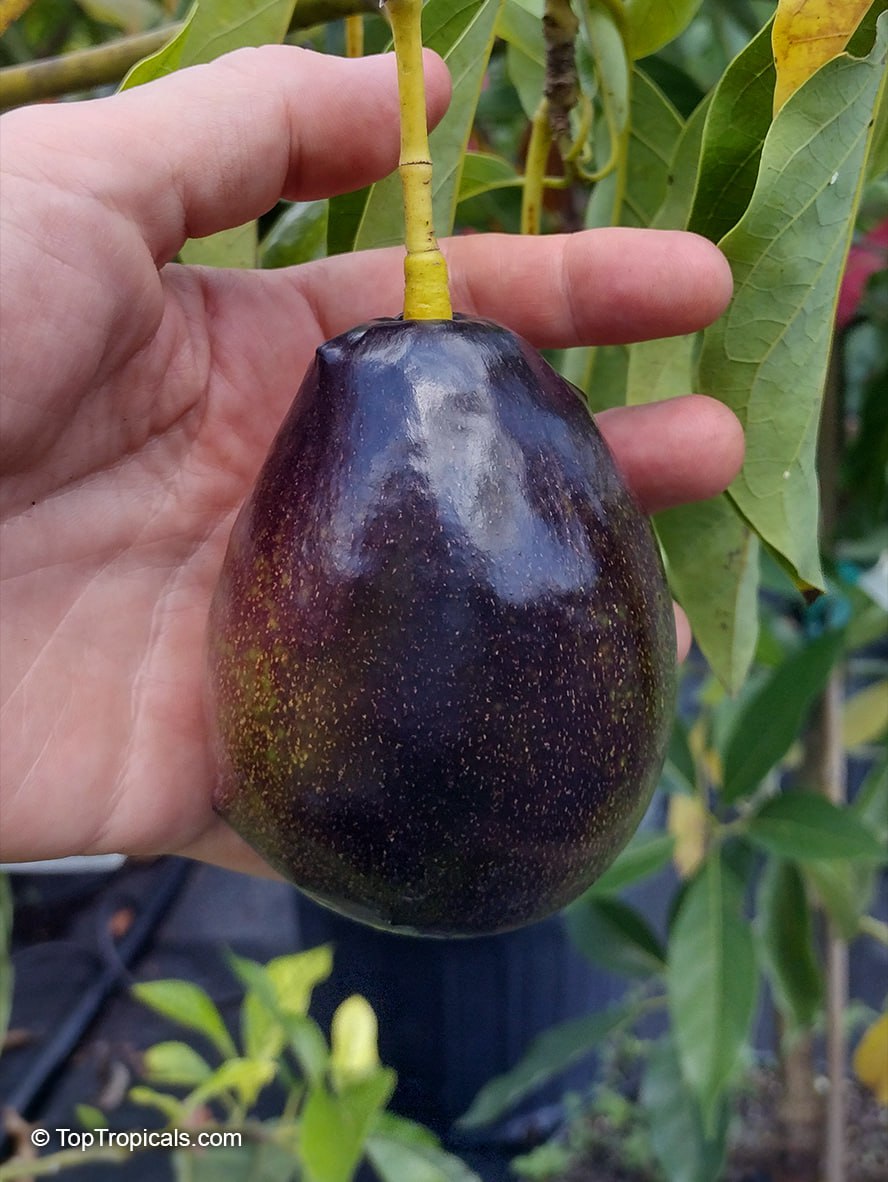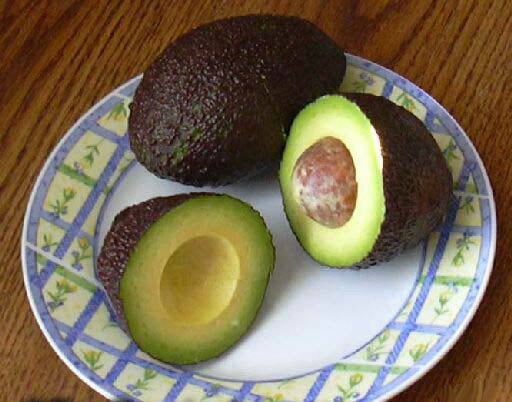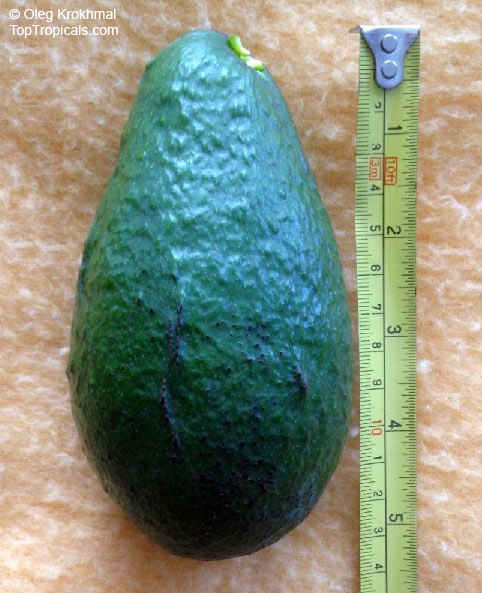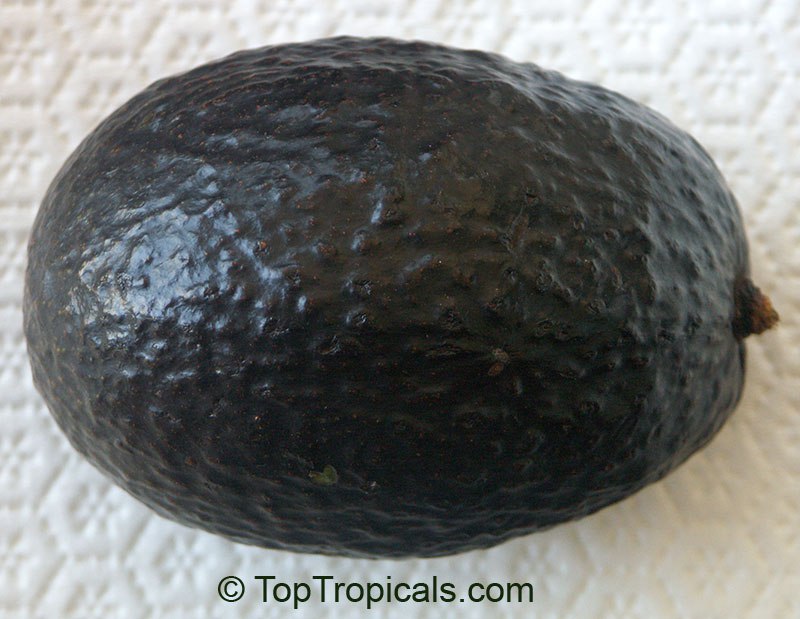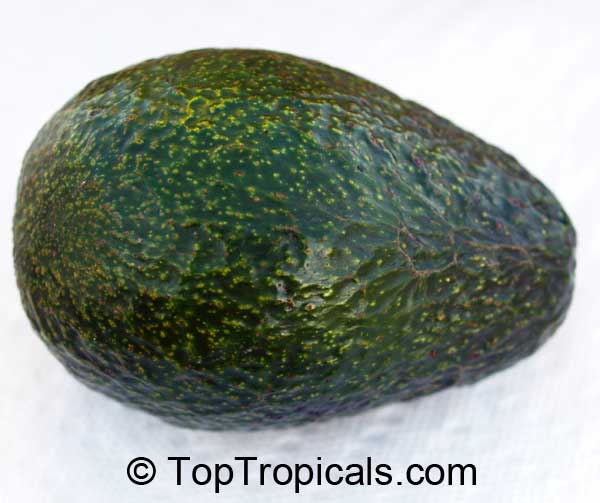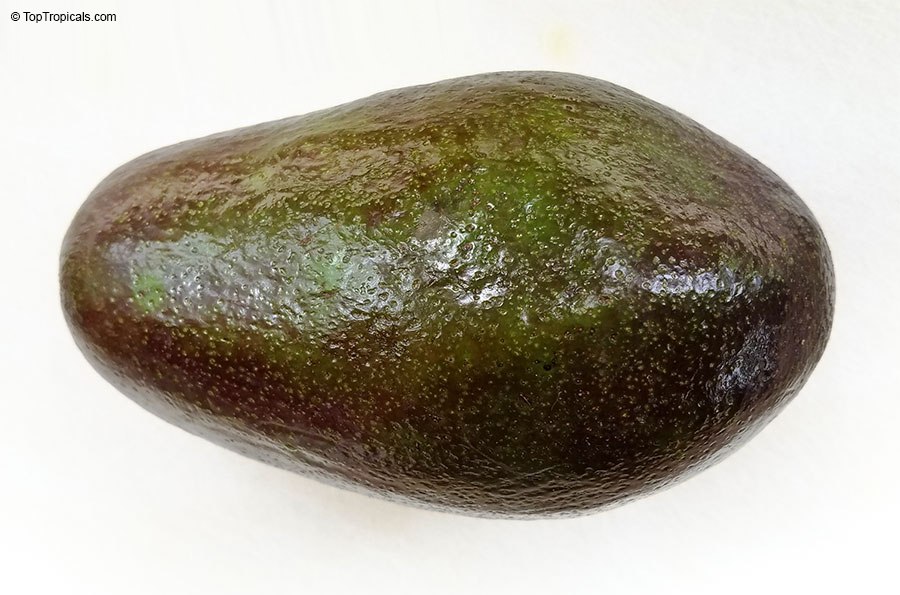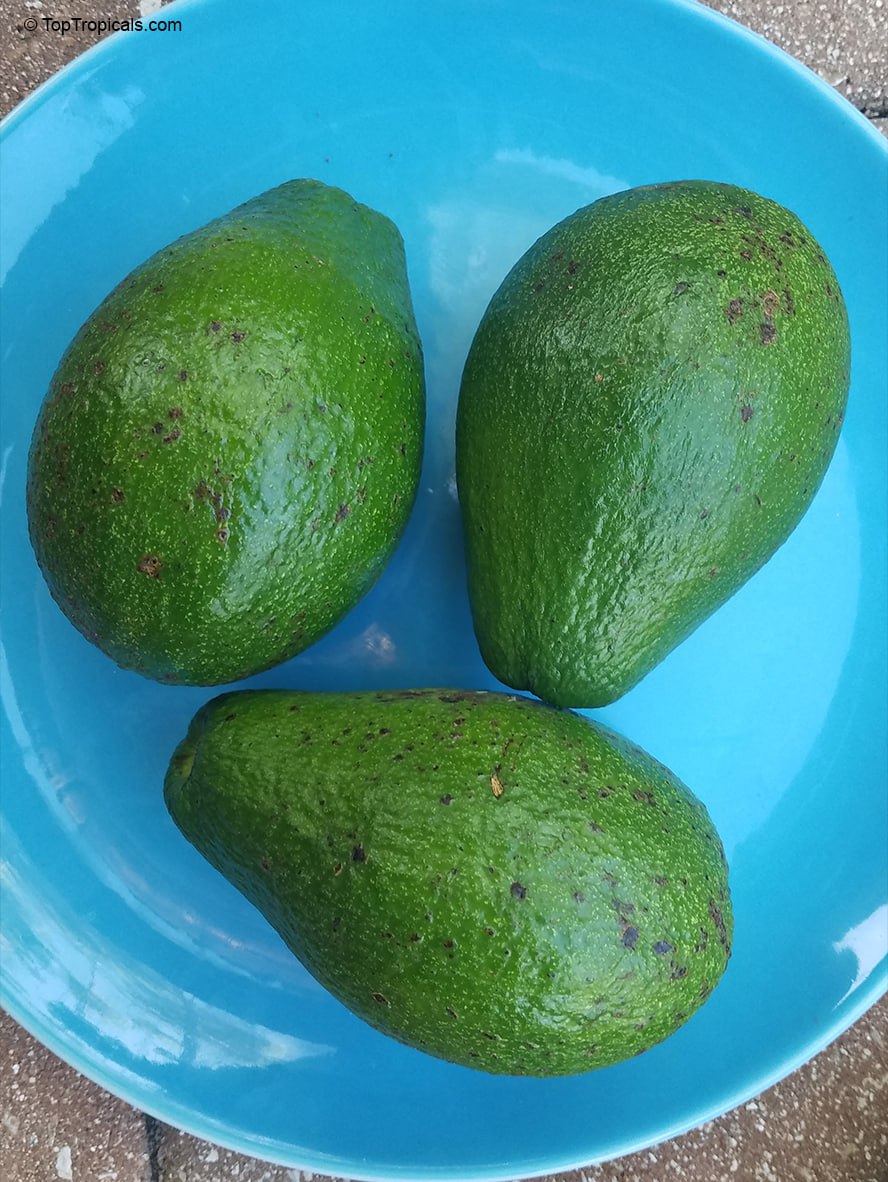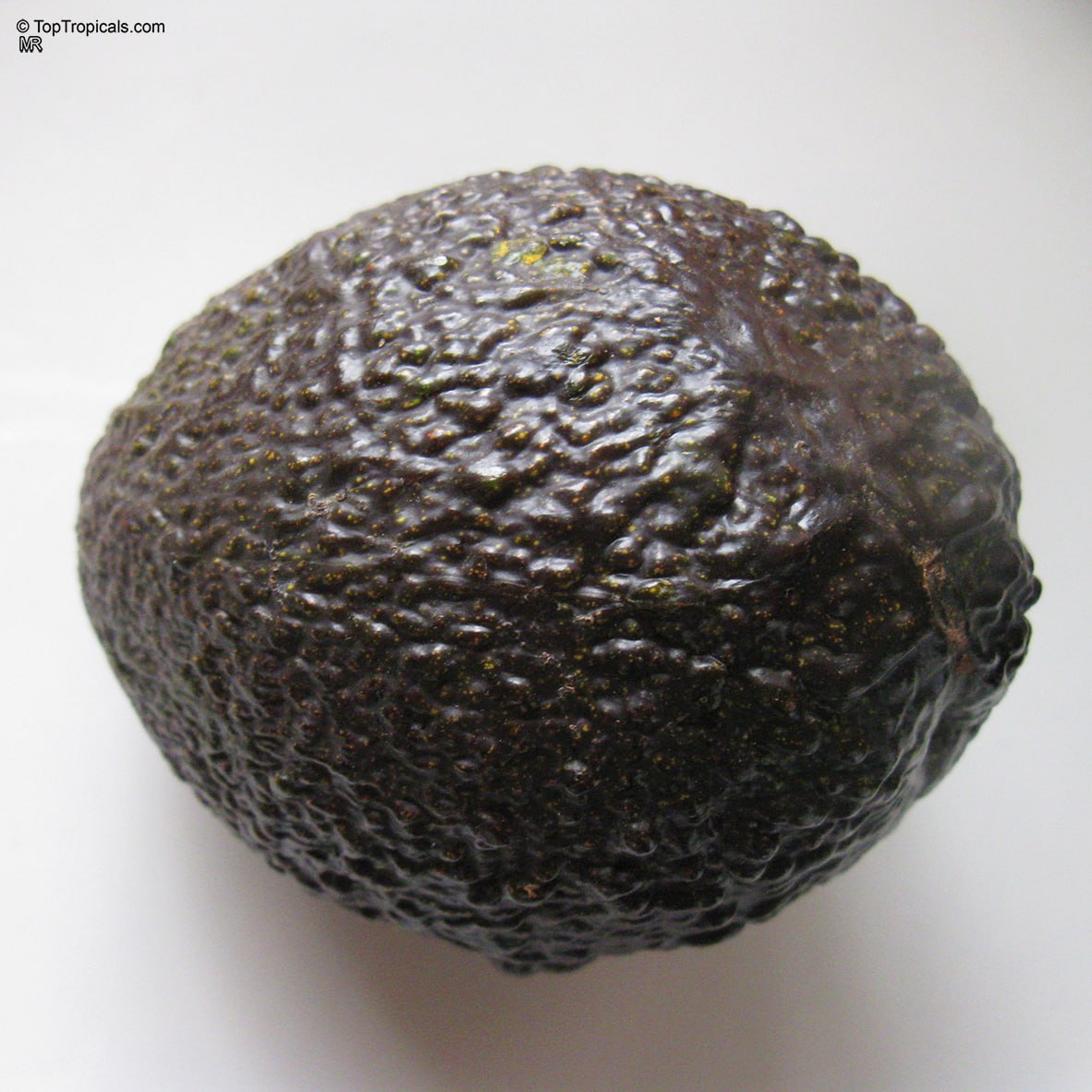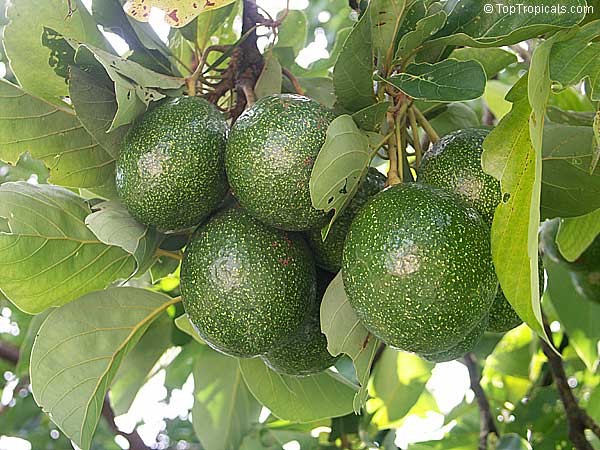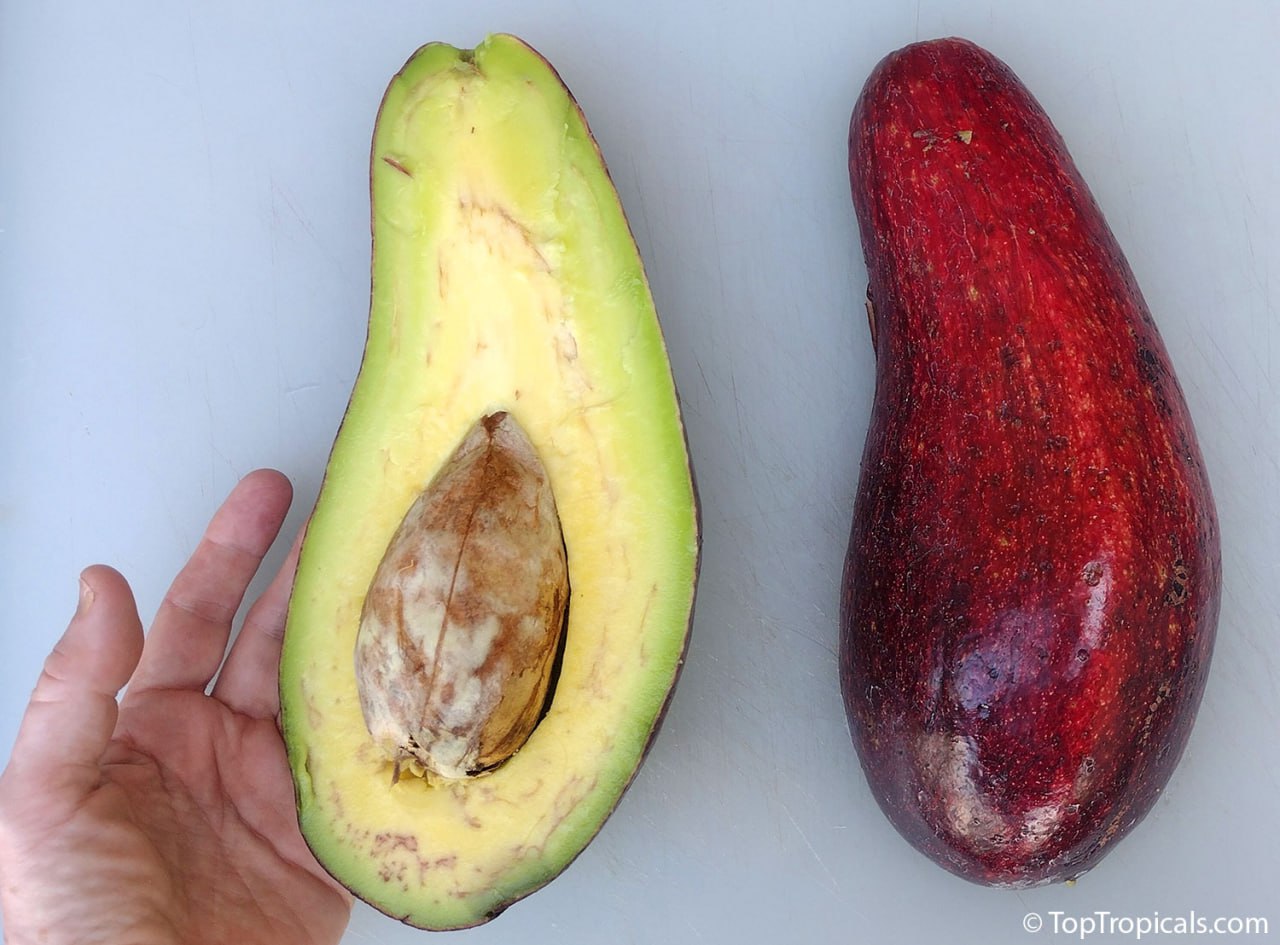Garden Blog - Top Tropicals
Date:
Avocado pollinating and crops
Photo above: Avocado Joey - very buttery fruit, cold hardy variety.
Q: I bought an anise leaf-scented avocado from you, and it is finally quite large and doing great. I live in California, the coldest temperatures we seem to get in some winters is around 25 to 28F, and it never lasts long. The tree might get a bit of frost nipping on the new growth, but it has done very well. It has flowered profusely for the last two years but hasn't set any fruit. What variety you might recommend to help with pollinating?
A: We are glad your avocado is doing great. Anise is one of our favorite varieties, with the wonderful smell of leaves and tasty fruit.
Cold hardiness and flower quality
It is true that cold damage may affect avocado production, especially in setting fruit. To improve the tree's cold hardiness, make sure to provide balanced plant food, especially during the season of active growth. For our avocado trees, we use Sunshine C-Cibus year-round.
If you prefer to use dry (granulated, slow-release) fertilizers, make sure they contain micronutrients, or apply Sunshine Superfood microelement complex once a month.
To improve flower quality (including the ability to set fruit), we recommend a special micronutrient supplement called Sunshine Honey. It contains Boron and Molybdenum - elements that are responsible for setting fruit and for developing fruit (meaning not dropping at the early stage of development).
Cross-pollination and crop
In general, every avocado tree is self-fertile, meaning it can produce some fruit with its own pollen and doesn't necessarily require a second tree for pollination. So even if you don't do anything, sooner or later your tree will set fruit. However, it is also true that the amount of fruit and crop reliability depends on pollination factors. One type of avocado classification is by flowering and pollination behavior - type A or B.
When both types of trees are grown in proximity to each other, their overlapping flowering patterns significantly enhance the chances of cross-pollination. This can lead to improved fruit set and higher yield, making it especially important for commercial production and, to a lesser extent, for home growers.
Therefore, it's advisable to plant different varieties of avocado in your garden - the more, the merrier! The greater the diversity of avocado trees with overlapping flowering periods, the better your crop is likely to be. If you're growing an avocado tree without other avocados nearby, it becomes helpful to have more than one tree with different flowering patterns (A and B) to increase yield in your garden.
Anise Avocado is type B. So to increase your crop, you may consider planting type A variety from the list: Bernecker, Black Prince, Catalina, Choquette, Day, Donnie, Fantastic, Florida Hass, Lila, Loretta, Lula, Mexicola, Mexicola Grande, Red Russell, Reed, Russell, Simmonds, Ulala , Waldin .
To learn more about avocado types, fruit characteristics, cold hardiness and much more, refer to our Avocado Variety Guide - a page with very convenient interactive chart allowing you to quickly sort types of avocado by requirements of your choice (just click on column header to sort data). You may also buy a Book or download a PDF.
Photo above: 15 gal Avocado trees for local pick up. Delivery and installation available!
What Guava variety is the best for Guava Wine
- 🍷 Araca Pera, or Brazilian Guava tree (Psidium x angulatum), is a unique Guava hybrid of a flavorful wild guava from the Brazilian Amazon which is rare in cultivation.
- 🍷 These fruit are 1.5-2", with an acidic, sour guava-like flavor. Its juice is concentrated and must be diluted and sweetened to produce a delicious drink.
- 🍷 It is the major source of a special Guava Wine production. Our favorite Guava Wine is from Schnebly Redland's Winery - this is where we obtained the seeds from their mother plants. This refreshing and vibrant rose wine is full of flavor and has a bouquet that never stops.
- 🍷 The fruit is processed into ice cream sorbet, gelatins and candies.
- 🍷 A great container specimen or a bushy tree for frost-free gardens.
📚 More about Guavas from previous posts:
- 💋 How to grow guava tree for Juice
- 💋 The most wanted collectible Honey Moon Guava
- 💋 Top 10 fast-fruiting trees: #2. Guava
- 💋 Costa Rican Cas Guava
- 💋 Guava for Drinking
- 💋 Guava for Juicing
🛒 Shop Guava trees
#Food_Forest
🔴 Join 👉 TopTropicals
Date:
Five most popular Avocado varieties
Food Forest
"What is the best variety of Avocado?"
"Do you have the one with small black fruit and bumpy skin?"
"I have avocado with very large green fruit, what variety is it?"
These are frequently asked questions we get from our customers. This basic "classification" by black/green doesn't encompass all the wonderful qualities avocados have to offer. There are numerous hybrids in cultivation, and once you plant your first tree and taste the REAL fruit (not from the grocery store), you'll be eager to explore other varieties. While it's true that avocado fruit can vary in "butter" content, most superior varieties are equally delicious. First comes first -
The most popular Avocado varieties this year are:
1. Brogdon - red-purple pear-shaped fruit, 7-15 oz. Skin is very thin, yellow buttery flesh. Fruit ripens in late summer-fall. Very cold hardy.
2. Hass - probably the most popular, but this tree prefers drier climate (Florida is humid, so we plant adaptable Florida Hass here). The fruit is dark-colored with a rough and bumpy skin, turns black when ripe.
3. Fuerte - a dwarf and a very cold hardy variety. Everybody's favorite "Condo Avocado": perfect for container culture and small yards. The mature tree in the ground is under 15 ft; 6-7 ft in containers.
4. Oro Negro - Oro Negro means "black gold" in Spanish, which is an incredibly appropriate name for this fruit. This Monroe hybrid (with big size fruit) is crossed with a Mexican type which would explain the black skin. The flesh is rich and buttery with a creamy texture.
5. Winter Mexican - one of most cold hardy varieties, Guatemalan x Mexican origin. Mature trees may withstand temperatures in the mid 20s. Oblong fruit, 12-18 oz, thick green skin. Very vigorous tree, bears heavily and regularly in December-January.
Learn more: Avocado Variety Guide - check this out for interactive chart of Avocado varieties and sort them by flower type A or B, tree habit, fruit shape and quality, cold hardiness, origin, season and more!
Photo above: Avocado Hass
Photo above: Avocado Fuerte
Photo above: Avocado Oro-Negro
Photo above: Avocado Winter-Mexican
Date:
Avocado Variety Guide: Snack or Guacamole?
Collector's inspiration
Photo above: It's NOT an egg plant! It's a Red Russell :)
A comprehensive guide to Avocado varieties by: flower type A or B, tree habit, fruit shape and quality, cold hardiness, origin, season and more!
Many gardeners who are eager to purchase their first avocado tree often wonder which variety to choose. Most people are familiar with two primary classifications commonly found in grocery stores: Small & Black or Large & Green.
Frequently, we hear customers ask, "Do you have the one I like, the smaller fruit with bumpy skin? Not that big, tasteless, and watery one!" What they may not realize is that this basic (but practical!) classification doesn't encompass all the wonderful qualities avocados have to offer. There are numerous hybrids in cultivation, and once you plant your first tree and taste the REAL fruit (not from the grocery store), you'll be eager to explore other varieties. It's a guarantee! While it's true that avocado fruit can vary in "butter" content and how "watery" or "buttery" it is, most superior varieties are equally delicious. Or perhaps we should say they are so versatile and distinct in taste that you'll start building your collection of these trees, much like fruit enthusiasts do with mango varieties.
Every garden has unique requirements based on climate, temperature, and property size. These factors must be considered before planning your avocado garden. Additionally, many gardeners may wonder about Type A vs. Type B classifications and whether they need more than one tree to yield fruit. You'll find all this valuable information in our Avocado Variety Guide.
Basic classifications of avocados
1) By flowering pattern and pollination behavior: Type A and Type B
2) By origin: Mexican, Guatemalan, and West Indian (along with many hybrids)
3) By fruit appearance, texture and taste: Guacamole Avocado ("Smooth skin") and Snack Avocado ("California" or "Hass" type)
4) By growth habit: full size trees, free branching or upright, semi-dwarf low growing, and dwarf ("condo avocados")
5) By cold hardiness: Cold sensitive (requiring frost-free conditions), cold tolerant (able to withstand light frost), and cold hardy (capable of enduring some hard freezes once established)
6) By ripening season: Early or Spring (March-June), Mid or Summer (July-September), and Late or Fall-Winter (October-February).
Date:
What is the best Avocado variety?
Grow Your Own Food
Q: Most trees in my yard were destroyed by hurricane Ian and now I have to start my landscape from scratch. So I decided to plant something useful. Avocado is my favorite. In the stores I see two kinds, large green or small black, but I was told there are many varieties. When I googled the best variety of avocado I found your website. You have quite a selection! Now I don't know which variety to chose. Can you please help? I have room for several trees.
A: Indeed there are many varieties of Avocado (we grow over 50 kinds). Some avocado lovers try
to get as many varieties as they can fit in their yards because every variety
has its unique flavor and texture.
2 main Avocado kinds that we usually see in grocery stores are -
1) smaller black fruit with rich, buttery texture - Mexican and Guatemalan
hybrids
2) green avocado, some can be as large as a small melon, but they have
light texture - West Indian types
There are many hybrids. How to pick the right variety for your yard?
Check out our Avocado variety page and scroll down to see a chart that shows characteristics of fruit, tree size, cold hardiness, and chose the right variety that fits your needs.
Below are just a few picks from our horticulturist - our favorite varieties that we enjoy and highly recommend to others.
Best tasting large green Avocado hybrids:
Bernecker, Beta, Doni, Catalina, Pollock.
Best tasting black or dark green, buttery Avocado hybrids:
Winter Mexican, Brogdon, Black Prince, Day, Fantastic, Florida Hass, Marcus Pumpkin, Mexicola Grande, Nishikawa, Waldin
Dwarf trees (black fruit):
For local customers: see large 15-gal size Avocado trees, delivery and installation available!
Today all avocados are 13% off instantly with no min. order, take advantage of this quick sale and get all varieties you want!
Top 10 fruit youll ever need for your health benefits:
#1. Guava 🍉
🟡 Guava is rich in vitamin C, which boosts the immune system and helps protect against colds and infections.- 🟡 Guava helps regulate blood sugar levels, making it a good option for people with diabetes.
- 🟡 Its potassium content helps maintain healthy blood pressure.
- 🟡 Guava's antioxidants, like lycopene and vitamin C, contribute to glowing skin and may reduce the risk of cancer.
- 🟡 Guava is eaten fresh, made into juices, jams, and jellies, or added to desserts and smoothies.
📚 More about Guavas from previous posts:
- 💋 What Guava variety is the best for Guava Wine
- 💋 How to grow guava tree for Juice
- 💋 The most wanted collectible Honey Moon Guava
- 💋 Top 10 fast-fruiting trees: #2. Guava
- 💋 Costa Rican Cas Guava
- 💋 Guava for Drinking
- 💋 Guava for Juicing
🛒 Plant a Guava Tree
#Food_Forest #Remedies #Guava
🔴 Join 👉 TopTropicals
Date:
Discovering the Amazing Guava Fruit Tree
A Gardener's Delight:
How to grow Guava Tree, delicious recipes and more...
Imagine stepping into your garden, plucking a fresh, juicy guava off a tree, and savoring its sweet, tropical flavor. Sounds delightful, doesn't it? Guava trees are not only a wonderful addition to any garden but also offer an array of delicious and nutritious fruits. Let's explore the fascinating world of guava fruit trees, dive into the different species, and share some tasty ways to enjoy this remarkable fruit.
If you're blessed with a warm climate, find a sunny spot with well-drained soil for your tree. Water it regularly, especially during dry spells, and keep it well-fed with a balanced fertilizer. Pruning is essential for maintaining a bushy, healthy tree that'll reward you with an abundance of fruits...
Date:
Grow Your Own Food:
Costa Rican Guava - Guava for Drinking!
by Alex Butova, the Witch of Herbs and Cats
...Looking for a handsome, unusual fruit tree for container culture with healthy and flavorful fruit? Or simply want an easy fruit tree that is hardy and undemanding? Psidium friedrichsthalianum (family Myrtaceae), the Costa Rican Guava or Cas Guava, is a perfect small guava tree that can be very rewarding. In Nicaragua it is called "Guava for Drinking" or "Fresco de Guava". Despite the tartness, the flavor is excellent with passionfruit and pineapple tones and is much more pronounced than the subtle flavor of the common Guava. These fruits are very much a part of the culture and cuisine of Costa Rica. Also it has been successfully grown in California now and can be grown in many subtropical regions or as a container plant - "condo" fruit tree...
What is the best Avocado variety? Five most popular Avocado varieties
❓ "What is the best variety of Avocado?"
"Do you have the one with small black fruit and bumpy skin?"
"I have avocado with very large green fruit, what variety is it?"
These are frequently asked questions we get from our customers. This basic "classification" by black/green doesn't encompass all the wonderful qualities avocados have to offer. There are numerous hybrids in cultivation, and once you plant your first tree and taste the REAL fruit (not from the grocery store), you'll be eager to explore other varieties. While it's true that avocado fruit can vary in "butter" content, most superior varieties are equally delicious.
✅ We will guide you through Avocado varieties like we did with Mango varieties in earlier posts. First comes first -
🏆 The most popular Avocado varieties:
1. Brogdon - red-purple pear-shaped fruit, 7-15 oz. Skin is very thin, yellow buttery flesh. Fruit ripens in late summer-fall. Very cold hardy.
2. Hass - probably the most popular, but this tree prefers drier climate (Florida is humid, so we plant adaptable Florida Hass here). The fruit is dark-colored with a rough and bumpy skin, turns black when ripe.
3. Fuerte - a dwarf and a very cold hardy variety. Everybody's favorite "Condo Avocado": perfect for container culture and small yards. The mature tree in the ground is under 15 ft; 6-7 ft in containers.
4. Oro Negro - Oro Negro means "black gold" in Spanish, which is an incredibly appropriate name for this fruit. This Monroe hybrid (with big size fruit) is crossed with a Mexican type which would explain the black skin. The flesh is rich and buttery with a creamy texture.
5. Winter Mexican - one of most cold hardy varieties, Guatemalan x Mexican origin. Mature trees may withstand temperatures in the mid 20s. Oblong fruit, 12-18 oz, thick green skin. Very vigorous tree, bears heavily and regularly in December-January.
📚 Learn more: Avocado Variety Guide - check this out for interactive chart of Avocado varieties and sort them by flower type A or B, tree habit, fruit shape and quality, cold hardiness, origin, season and more!
🛒 Shop Avocado Trees
#Food_Forest
🏵 TopTropicals
Five most exotic avocado varieties
👀 We introduced 10 most popular varieties in our earlier posts. Here are 5 more - interesting and unusual cultivars.
1. Bacon - A large Mexican variety with dark-skinned medium sized fruits, and a rich creamy flavor. It is very cold hardy, late-producing variety of Avocado tree with exceptional fruit. It is a highly productive tree with a lovely upright and spreading habit. Its dark green, glossy leaves lend an attractive, tropical appeal to the 15-20 feet of heigh. The oval fruits ripen in late fall and into spring. The fruits are easy to peel and have a light, subtle flavor. The tree has angelic sweeping branches which helps keep the tree shorter and easier to pick its fruit.
2. Black Prince - The fruit was large, oval, 16-36 oz, green and slightly pebbly. The fruit turns black couple days after it is picked, ripens and softens. Black Prince deserves its title! The fruit pulp is thick, and has a rich, nutty flavor. The trees grow vigorously. Superior variety for a backyard grower. Harvesting mid-August to mid-September.
3. Mexicola - black fruit, rich butter content, one of the most cold hardy varieties. Mature trees may withstand temperatures in the low-mid 20s.
4. Reed - The fruit is large, weighing over a pound and round in shape. It has a large seed, but plenty of edible flesh. The skin remains green even when ripe. It is described by some as the best tasting avocado, buttery, bold, rich and nutty with an oil content of about 20%. It is a type A avocado, but fruits consistently year after year without other avocado trees around. It can be kept to around 15 feet with pruning. The branches do tend to droop horizontally.
5. Russel (green and red) - easily recognized by its gourd-like shape, large, 24-36 oz and up to 13 inches long! Flesh is yellow, sweet, excellent quality, the seed is small.
📚 Learn more: Avocado Variety Guide - check this out for interactive chart of Avocado varieties and sort them by flower type A or B, tree habit, fruit shape and quality, cold hardiness, origin, season and more!
❔ What is your favorite Avocado variety?
Share in comments👇
🛒 Shop Avocado Trees
#Food_Forest #Avocado
🔴 Join 👉 TopTropicals
